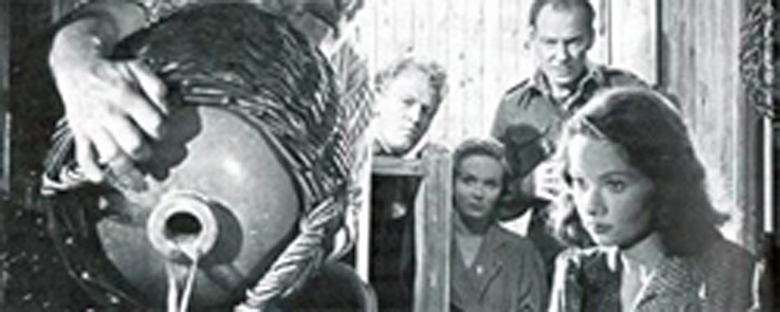Reviews
Alexander Mackendrick
UK, 1949
Credits
Review by Tom Huddleston
Posted on 08 November 2005
Source VHS
The island of Todday, Scotland, 1943. The tiny, isolated fishing village of Garryboo is suffering badly from the effects of wartime rationing—there isn’t a drop of whisky to be had on the island. When a naval supply ship runs aground with a cargo of several thousand bottles of His Majesty’s finest, the townsfolk band together to rescue the salvage. But they’ve reckoned without the officious Captain Waggett of the Home Guard, who disapproves strongly of both drinking and looting, and will stop at nothing to see justice done…
Whisky Galore! was one of the films that firmly established the nascent Ealing studio as Britain’s foremost film factory in the postwar years. It also marked the feature debut of U.S. born Alexander Mackendrick, who would go on to helm Ealing’s last and perhaps greatest film, The Ladykillers, as well as the brutal Burt Lancaster/Tony Curtis masterpiece Sweet Smell Of Success. Lovers of those films will recognise several of Mackendrick’s stylistic traits already present in Whisky Galore!. He exercised extraordinary control over the visual content of his films, and he draws from a stylistic palette as distinctive as any of the great directors of the day: Wellesian deep focus photography is used to stunning effect both on the desolate island exteriors and within the cosy cottages. The use of expressionistic lighting to make even the most unremarkable human face seem ludicrous or devilish, maniacal or piteous, was a technique that would recur throughout Mackendrick’s work—think of the leering mask Alec Guinness wears throughout The Ladykillers, or Lancaster, haunted and empty in Sweet Smell of Success. There’s nothing here to warrant such grotesquery, but Mackendrick still manages to highlight the contours and shifting textures of human expression in a way which is striking and often quite beautiful. He also displays his aesthetic sophistication in a pair of brief but captivating montage sequences, as the villagers first indulge in, then attempt to conceal the stolen liquor.
Whisky Galore! is part of a cycle of films, both British and American, made during or shortly after World War II which aim to celebrate the culture that spawned them (other British examples would include A Canterbury Tale and Ealing’s own Passport to Pimlico). Although these films do not directly consider the war, they are steeped in wartime symbolism and nationalistic sentiment; images of camaraderie and selflessness abound. However, while our cousins across the pond were proudly extolling their native resilience, dignity and can-do spirit, we Brits were more than happy to count alcoholism, looting and petty rebellion among our national virtues. For Whisky Galore! was made long enough after the war to escape any kind of propagandist censorship, and is willing to poke gentle fun at the military elite. In this sense the film acts as an indicator of how much things had changed in British life over the course of the war—the upper-middle class stuffed shirt, once the hero, had become a figure of fun, while the ordinary working class soldiers and fishermen had moved to centre stage.
But perhaps the most extraordinary aspect of this odd little film is its depiction of the wonders of alcoholic indulgence. Alcohol is shown as not just a tonic, but as the lifeblood of the community, an almost magical release from the drudgery of everyday life. A man seemingly languishing on his deathbed is miraculously revitalised by just a few glasses of the good stuff. It’s perhaps the first example of that uniquely wry sense of irony that set the Ealing comedies apart—extreme characters and extreme situations used to reflect and comment on actual trends in British society, in this case our national reliance on booze to escape reality.
Whisky Galore! is one of those films which has gradually crept into the national consciousness, to the point where it was even satirised in BBC comedy The Fast Show in a sketch titled Heroin Galore! (you can guess the rest). It depicts a world long gone but lovingly remembered—the glory years of unity following the horrors of WW2. And it contains a unique combination of joyful innocence and sly self regard that would be quite impossible in today’s cultural environment.
We don’t do comments anymore, but you may contact us here or find us on Twitter or Facebook.



